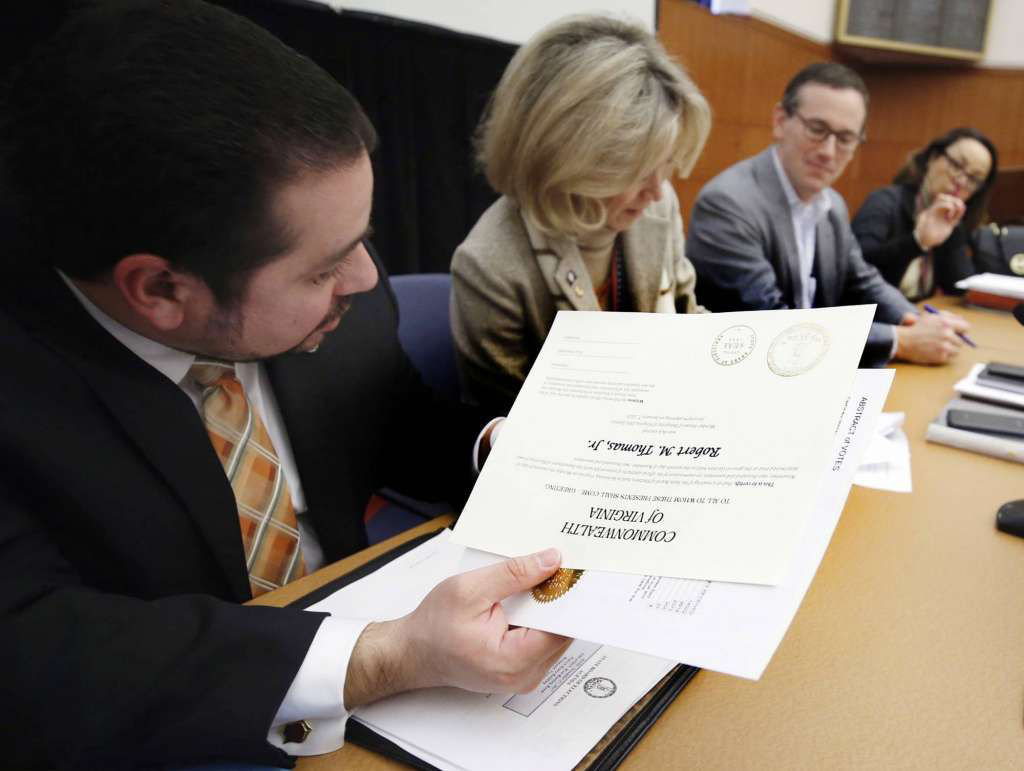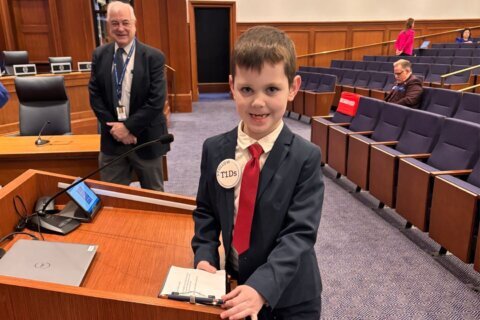
WASHINGTON — Plans to prevent an infinite recount loop appear to be on track for passage in Richmond.
On Friday, the House Privileges and Elections Committee unanimously supported a bill from Del. Marcus Simon of Falls Church that would clearly state only one recount is permitted. After a Newport News delegate race recount ended in a controversial tie, there were questions about whether state law would have allowed a second due to conflicting statutes.
The full House could approve the bill next week and send it to the Senate.
A bill sent to the full House — sponsored by the committee chairman, Del. Mark Cole of the Fredericksburg area — would address the issues in Cole’s district and the adjoining 28th District, where at least 147 voters cast ballots in the wrong races Nov. 7.
The bill would allow a voter who realizes he or she is getting the wrong ballot in a split precinct to vote in each race with separate provisional ballots. The local electoral board would then sort out which ballot should be counted.
That would have helped the handful of voters who realized there was a problem at the polls Nov. 7.
The committee also narrowly approved bills that would significantly change the State Board of Elections and that would take away the governor’s power to appoint someone to fill a U.S. Senate vacancy until a special election.
Today, the Board of Elections is three members, with two appointed by the governor’s party and one by the opposition party, and the Department of Elections reports to the governor. The bill would give an evenly split six-member board the power to pick the commissioner of elections which would in turn lead the department. It’s a proposal Gov. Ralph Northam is likely to be concerned with as an infringement on existing executive power.
(Gov. Ralph Northam Friday appointed Chris Piper as the new commissioner of elections to replace Edgardo Cortes, who did not stay on from the McAuliffe administration. Piper has been leading Virginia’s ethics panel, but previously worked in elections administration in Virginia and D.C.)
Del. Mark Sickles suggested that the change could be sent to the special joint committee Republican leaders announced Thursday. It will study any significant election changes that could be introduced in the 2019 session ahead of the November 2019 General Assembly elections.
Other proposals — like holding a special election instead of a random drawing to resolve a tie, and a bill that would have defined the period when a ballot can be challenged during a recount — failed at the subcommittee level. The committee is still considering a bill that would require third-party voter registration helpers to share their name and contact information, so registrars could call with questions.
Senate passes redistricting change
A hotly debated redistricting change passed the Senate 22-17 on Friday.
The bill would prioritize existing political lines when drawing congressional and General Assembly district boundaries every 10 years. It also includes a provision strengthening Virginia’s policy that districts be compact.
Republican Sen. David Suetterlein’s bill would require numerical measures of individual and average district compactness to guard against the long tendrils that can reach miles in odd directions.
Sen. Janet Howell opposed the bill. A similar measure that the Democrat from Fairfax County introduced had additional provisions that the General Assembly would have been required to consider in drawing the lines.
“The one of most importance, the one dealing with gerrymandering directly, is no longer in the bill,” she said.
Democratic Sen. John Edwards challenged the focus on existing political boundaries of counties, cities, towns and city council or county supervisor seats, because some of the lines date back to at least the 1800s.
“This is like putting a square peg in a round hole. It doesn’t fit,” he said.
Edwards urged the General Assembly to wait for a Supreme Court ruling on redistricting rules that is expected this spring.
Republican Sen. Dick Black of Loudoun County, who supported Suetterlein’s bill, said it is time for more compact districts. He told the story of a long sprawling district that stretched from Arlington into Loudoun to give Democrats an edge back when they were drawing lines.
“It stretched all the way down the Potomac River until it etched Dick Black’s neighborhood,” he said. “Dick Black, unbeknownst to the world, had moved, and so here I am.”
The bill does not address calls from Bath County Democratic Sen. Creigh Deeds and others for a bipartisan or nonpartisan redistricting panel to take the line drawing out of the hands of legislators.
“The people who want redistricting reform are interested … in districts that produce more competitive races. And the competitive races are not the end in themselves. The competitive races, they hope, will produce a legislative body that is more conducive to solving problems and not just a polarized debating society,” Deeds said.








